Contact us today:
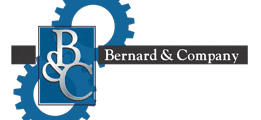
(847) 934-4500
tdaro@bernardandcompany.com

Contact us today:
(847) 934-4500
tdaro@bernardandcompany.com
Press safety: ready-to-install Simotion Safety Unit provides certified control reliable solution for Windsor Match Plate & Tool Ltd. Click here to view the case study and visit Siemens at Fabtech, Booth S-4686!
For additional product information and inquiries, call (800) 879-8079 ext. Marketing Communications or send an e-mail to: SiemensMTBUMarCom.industry@siemens.com.
Follow us on Facebook: www.facebook.com/SiemensCNC or Twitter: www.twitter.com/siemens_cnc_us.
—
Siemens Industry Sector is the world’s leading supplier of innovative and environmentally friendly products, solutions and services for industrial customers. With end-to-end automation technology and industrial software, solid vertical-market expertise, and technology-based services, the sector enhances its customers’ productivity, efficiency and flexibility. With a global workforce of more than 100,000 employees, the Industry Sector comprises the Industry Automation, Drive Technologies and Customer Services Divisions as well as the Metals Technologies Business Unit. For more information, visit http://www.usa.siemens.com/industry.
The Siemens Drive Technologies Division is the world’s leading supplier of products, systems, applications, solutions and services for the entire drive train, with electrical and mechanical components. Drive Technologies serves all vertical markets in the production and process industries as well as the infrastructure/energy segment. With its products and solutions, the division enables its customers to achieve productivity, energy efficiency and reliability. For more information, visit http://www.usa.siemens.com/drivetechnologies.
Continue readingWhen implementing mechanical and hydraulic presses and handling equipment, for instance in the automotive industry, a predominantly modular design ensures the highest degree of flexibility and shortest engineering and installation times for customized systems. The Metal Forming Solution Package provides all of the functions required to automate press systems, therefore supporting press manufacturers when quickly implementing their specific press concepts.
View the Metal Forming Solution Package Brochure and visit Siemens at Fabtech, Booth S-4686!
Additional information can be found on the Siemens US metalforming website.
See below for customer reference videos:
For specific product information and inquiries, call (800) 879-8079 ext. Marketing Communications or send an e-mail to: SiemensMTBUMarCom.industry@siemens.com.
—
Siemens Industry Sector is the world’s leading supplier of innovative and environmentally friendly products, solutions and services for industrial customers. With end-to-end automation technology and industrial software, solid vertical-market expertise, and technology-based services, the sector enhances its customers’ productivity, efficiency and flexibility. With a global workforce of more than 100,000 employees, the Industry Sector comprises the Industry Automation, Drive Technologies and Customer Services Divisions as well as the Metals Technologies Business Unit. For more information, visit http://www.usa.siemens.com/industry.
The Siemens Drive Technologies Division is the world’s leading supplier of products, systems, applications, solutions and services for the entire drive train, with electrical and mechanical components. Drive Technologies serves all vertical markets in the production and process industries as well as the infrastructure/energy segment. With its products and solutions, the division enables its customers to achieve productivity, energy efficiency and reliability. For more information, visit http://www.usa.siemens.com/drivetechnologies.
Continue readingSee the MJC video HERE.
Custom machine tool builder in California contracts with research center at university in Glasgow, Scotland to design specialized equipment for forming new jet engine structures; machine completely controlled by Siemens CNC
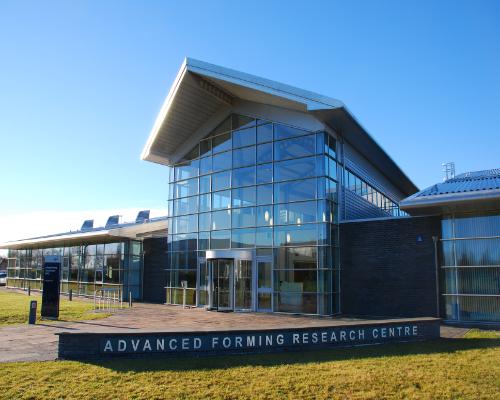
AFRC facility performs fundamental and applied research on the forming and forging of metals, primarily for aerospace applications. A full battery of materials and performance testing is conducted at AFRC by a team of materials and process experts
MJC Engineering is a custom machine tool builder, specializing in metalforming machines for such applications as spinning, flow forming, wheel spinning and rotary forging. The company was recently contracted by the Advanced Forming Research Centre (AFRC) at the University of Strathclyde in Glasgow, Scotland for a very unique application, namely, a cold-forming rotary forge press that works the material between two synchronized rotary dies. The dies operate in angle from the parallel. Typically, the angle is fixed but, on this custom designed machine from MJC, the angle is fully programmable. This configuration allows compression in a concentrated area and provides a more efficient method for metal deformation, while producing superior mechanical properties in the finished section. Up to 90 percent material savings can be achieved by the use of this revolutionary metalforming technology, in comparison to conventional machining from a solid blank.
Operator loads workpiece during test run-up on machine; very hard aerospace materials such as Hastelloy and Inconel are typically processed
The aim of this new CNC technology, according to MJC company president Carl Lorentzen, is to make the aerospace engineers rethink how they design their products, so that a maximum material savings on exotic and costly metals can be realized.
Rotary forging can be defined as a two-die forging process that deforms only a small portion of the workpiece at a time, in a continuous manner. The reduced instantaneous area of tool and workpiece contact means lower forging forces are required to cause deformation in the material. Typical components for rotary forge operations are round or cylindrical hollow parts that deploy expensive or exotic alloys, require extreme material property targets or involve very complex geometries. At AFRC, the rotary forging machine provided by MJC is processing AerMet® 100, Inconel 718 and Allvac® 718Plus®, Ti-6Al-4V as well as the creep-resistant Ti6242 and some beta alloys.

New rotary forge press from MJC, built specially for the Advanced Forming Research Centre (AFRC) at the University of Strathclyde in Scotland. Two independent and synchronized rotary dies are fully programmable on the Siemens CNC to affect 0-45º pitch angles
Onboard the machine, the bottom and top spindles pivot from 0-45º, operated by AC vector motors and drives, plus an overall motion control CNC, all provided by longtime supplier to the builder, Siemens. The CNC is a Sinumerik 840D, which controls all the axis and spindle motion, hydro and servo positioning valves, plus the synchronization of up to four cylinders for the integrated motion of the rotary dies. In the processing of the workpiece, the control is monitoring all machine conditions, while maintaining the synchronized angles of the twin rotary dies.
Programmed motion sequences on the machine must be maintained with high precision to avoid improper deformation of the materials during the cold-forming process. In a manufacturing environment, where the high production output of parts is critical, this process must remain extremely well-regulated, documented and monitored. The CNC has the capability to upload all data in real time.
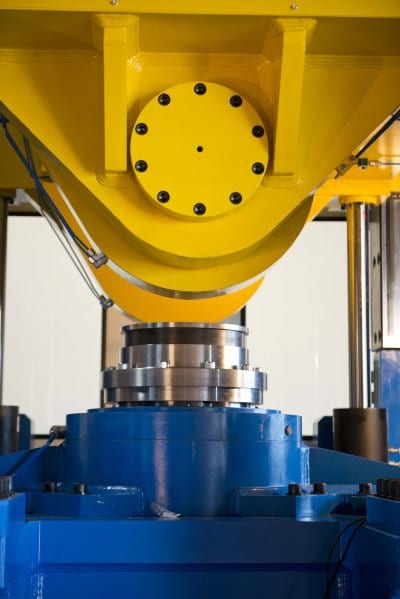
The unique operation of this MJC rotary forging press involves the application of pressure on a small portion of material at a time, reducing stress and saving up to 90% in material, compared to subtractive machining from a solid blank
Carl Lorentzen comments further on this MJC development, “Though the concept of the rotary die forge is certainly not new, the computer-controlled synchronized dual rotary dies on this machine offer a number of unique advantages in the cold-forming process of metals. The idea originated in a somewhat different form in the automotive market with the development of a front wheel hub hollow shaft. The cold-forming of metal around a bearing was combined with robot loading in production. The concept, combined with the Siemens CNC and its ability to control all the motion so precisely, made the development of this machine more practical for us.”
MJC is a custom machine tool builder, with equipment currently serving in the military, aerospace, general metalforming and automotive after-market segments of industry. The company is a member of PMA, NFTC and AMT.
The AFRC is jointly sponsored by the Scottish government, Scottish Enterprise and a variety of international aerospace manufacturers and engineering firms, including Boeing, Rolls Royce, TIMET, Aubert & Duval and Barnes Aerospace. It has operated as a world-class facility, supporting fundamental and applied research into the forming and forging of metals, since 2009. Having doubled in size recently, AFRC is expanding its market applications into the automotive, energy and marine markets. The center can currently heat, shape, finish, measure, test and analyze all types of metal materials and components in-house. The research done here comprises investigations into residual stress, die life, process characterization, materials characterization, heating and thermal processes, super-plastic forming, sheet forming and related technologies in automation, metallurgy and metrology.
The key challenge for AFRC, according to its website, is to take low maturity technology developed in a university environment and successfully deploy it into a manufacturing facility.
See the video of MJC @FabTech HERE.
For more information on this story, please contact:
MJC ENGINEERING & TECHNOLOGY, INC.
15701 Container Lane
Huntington Beach, CA 92649
Phone: 714-890-0618
Fax: 714-895-3561
Web: www.mjcengineering.com
Email: clorentzen@mjcengineering.com or carlson@mjcengineering.com
Attention: Carl Lorentzen, President or Per Carlson, VP
or
SIEMENS INDUSTRY, INC.
DRIVE TECHNOLOGIES
MOTION CONTROL
390 Kent Avenue
Elk Grove Village, IL 60007
Phone: 847-640-1595
Web: www.usa.siemens.com/cnc
Email: SiemensMTBUMarcom.industry@siemens.com
Attention: John Meyer, Manager of Marketing Communications
Follow us on Facebook: www.facebook.com/SiemensCNC or Twitter: www.twitter.com/siemens_cnc_us.
—
Siemens Industry Sector is the world’s leading supplier of innovative and environmentally friendly products, solutions and services for industrial customers. With end-to-end automation technology and industrial software, solid vertical-market expertise, and technology-based services, the sector enhances its customers’ productivity, efficiency and flexibility. With a global workforce of more than 100,000 employees, the Industry Sector comprises the Industry Automation, Drive Technologies and Customer Services Divisions as well as the Metals Technologies Business Unit.
The Siemens Drive Technologies Division is the world’s leading supplier of products, systems, applications, solutions and services for the entire drive train, with electrical and mechanical components. Drive Technologies serves all vertical markets in the production and process industries as well as the infrastructure/energy segment. With its products and solutions, the division enables its customers to achieve productivity, energy efficiency and reliability.
Hennig chip conveyors on Niigata machining centers maintain efficiencies and production on ductile iron castings used in heavy truck and military drive train projects at Michigan shop
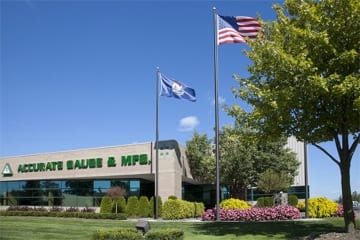
The shop machines over 98% of its workpieces from ductile iron and the iron sludge build-up in the coolant tank is an all too familiar problem for the production personnel. As Accurate’s engineering manager Mark Tario explains, “We approach every machine with a keen eye on machine uptime and an absolute ease of maintenance. We had experimented with other systems to handle cast ductile iron fines and knew their benefits as well as their shortcomings.” Mark notes the company had actually designed two systems in-house to improve the handling of chips and the cleaning of coolant. While the benefits had been appreciable, they felt there was still a shortfall and the team at Accurate began a systematic search for a better solution.
One of the potential vendors, Hennig, was an established force in the market, as the company’s chip conveyors and machine enclosures are found on many of the global machine tool builders’ equipment. A particular development from Hennig caught the attention of the team at Accurate, namely, a magnetic chip disc filtration system that represented a substantial improvement over the traditional drum screen filtration system used on most competing brands. The relative ease of changeover immediately impressed the Accurate engineers, both from the production and maintenance perspectives. As Mark explains, “Replacing the drum filter screens is not an easy task, in fact it can be downright miserable. The Hennig disc arrangement seemed to us a much easier system to operate and maintain. The incorporation of a rare earth drum & scraper assembly inside the conveyor appeared to be a great solution for minimizing the amount of cast iron fines reaching the coolant tank side of the system.” Mark notes the heavier-duty mechanical components and drive chains used on the Hennig conveyor were also impressive, providing a greater wear life and reduced downtime likelihood.
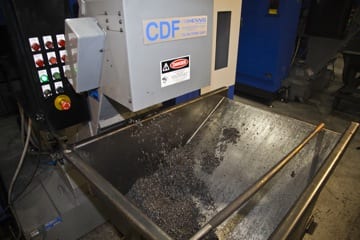
Every aspect of the machine-to-conveyor connection was planned out by the Accurate team, including the layout of the coolant tank covers and the access ports. This attention to detail is something in which the company takes great pride. “The Hennig team was very good on this job and they realized that nothing less than their best efforts would satisfy us,” Tario notes.
Among the many issues Accurate had to overcome, downtime for maintenance was the most prominent. The machining of cast iron, by definition, creates considerable problems arising from the frequent need to replace conveyor chains, drum screens and other mechanical components that get infiltrated by the iron fines and literally lock up. The conveyor chains on the Hennig system, for example, were found stronger than the typical styles used on competing brands, which often required adjustments and repairs several times annually and were usually in need of total replacement, once a year. Depending on the severity of the repair or replacement operation, this situation resulted in many hours or even several days to rectify. Practically speaking, the maintenance personnel would get completely soaked and filthy with the coolant and sludge as a result.
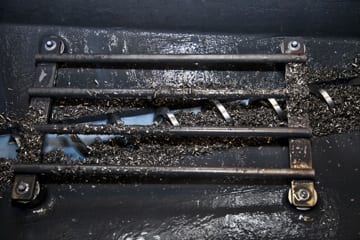
Another common problem for the maintenance personnel are coolant related failures. On the HMCs at Accurate, a substantial amount of “through the spindle coolant” is used to improve productivity. However, this generous use of coolant can create an immediate and dangerous problem, if the coolant runs low and the machine has no safeguard-warning device, especially when drilling and tapping. Nearly half the Accurate systems had no such devices originally, resulting in some damage conditions on the high-speed drills used here. A third of the later systems used at the company had a communication device to put the machine’s CNC into a single block state when the coolant tank ran low, but had no protection to shut off the pump to prevent dry running. Mark notes, “On our third generation systems, we changed from a diaphragm style pump to a screw pump, where dry running would be very bad, to say the least. With our fourth generation Hennig conveyors, however, we have all the protections of the previous generations plus all the necessary controls to shut down the pumps to prevent very costly system component damage.”
Accurate has already installed four Hennig systems, just received an additional three and has plans to purchase two more shortly, for a total of nine in the shop. All are connected to Niigata HMCs that have an opening in the back of the machine with a horseshoe-shaped channel where the conveyor fits. The overall machine size is 10’ wide by 30’ long.
Other Accurate personnel involved in this project who contributed to the story include Greg Mann, plant manager, Dennis Shepp, maintenance technician and Jim Weeks, shift supervisor and maintenance technician.
To see a video of this installation, please go to http://youtu.be/GDPHtJdFul4
—
Hennig, Inc. designs and produces custom machine protection and chip/coolant management products for state-of-the-art machine tools. Hennig products are designed to protect against corrosion, debris and common workplace contaminants. Manufacturing facilities located in the USA, Germany, France, Brazil, India, Japan, Czech Republic, England and South Korea. Repair centers are located in Machesney Park, IL; Chandler, OK; Livonia, MI; Blue Ash, OH; Mexico City, Mexico; and Saltillo, Mexico.
To learn more about Hennig products & services, visit www.hennigworldwide.com or call 1-888-HENNIG6 (436-6446).
For more information, please contact:
Tim Waterman
Hennig, Inc.
2500 Latham St.
Rockford, IL 61103
Phone: 815-316-5277
Fax: 815-962-6483
E-mail: info@hennig-inc.com
Connect with Hennig online:
For more information on Accurate Gauge in this story, please contact:
Accurate Gauge & Manufacturing, Inc.
2943 Technology Drive
Rochester Hills, MI 48309
Phone: 248-853-2400
Web: www.accurategauge.com
Email: mark@accurategauge.com
Mark Tario, Engineering Manager
Ann Arbor, Michigan – GMTA (German Machine Tools of America) represents various top-quality German metalworking machine builders, including Profilator, Pittler, Praewema and WMZ. These machines are sold to the North American market by GMTA primarily for gear and spline production, as well as other power transmission applications. The company’s target markets include automotive, off-highway, OCTG and other heavy equipment manufacturing. Machines are provided for gear honing, gear grinding, Scudding®, polygon milling, turning, gear tooth pointing and multiple machining operations.
In the news…
-DVS, the parent company of Pittler, Praewema and WMZ in Germany, has plans to expand its North American operations, owing to the success achieved with GMTA in this market
-Scudding® technology, pioneered by Profilator, continues to impact the North American gear and spline markets, due to its superior performance compared to other methods of production; several competitors trying to offer it, proving that indeed, “Imitation is the sincerest form of flattery.”
-The renovation of the GMTA facility in Ann Arbor, Michigan is now complete with plans in the works for future expansion of the campus. Additional floorspace, showroom capacity and training facilities, plus more personnel, are planned, according to company VP Scott Knoy.
-Now in final runoff with anticipated start-up in June, GMTA has provided eight machines (16 spindles total) for the advanced cylinder lining program to the Caterpillar operation in Mapleton, Illinois; project for GMTA valued at $15,000,000
-Order received from Chrysler for Phase III transmission line at IPT1 in Indiana
-GMTA and DVS will have joint booth space, considerably expanded, at IMTS 2014
For more information on this announcement, please contact:
GMTA (German Machine Tools of America)
4630 Freedom Drive
Ann Arbor, MI 48108
Phone: 734-973-7800
Fax: 734-973-3053
Web: www.gmtamerica.com
Email: scott@gmtamerica.com
Attention: Scott Knoy, VP
Connect with GMTA online:
Getting started with live tools…
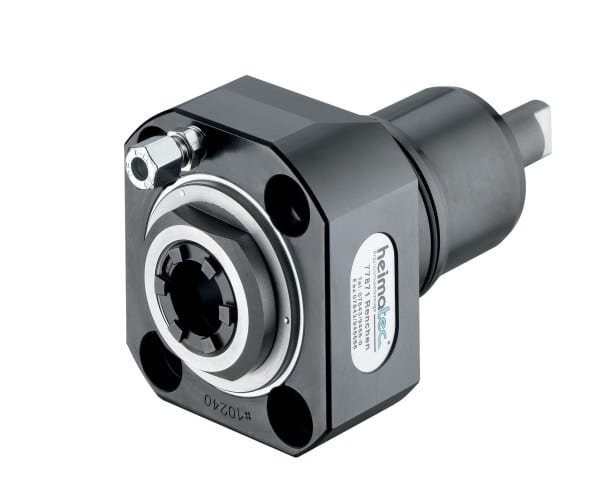
A flexible tool adapter system can be a big time and money saver, if properly utilized and properly designed for maximum power transmission and accuracy in alignment.
When any metalworking manufacturing facility, whether captive or job shop, makes the substantial investment in a new lathe, they are often looking for ways to streamline the manufacturing process. The smarter you are when choosing the live tools for your job, the more efficient the machine becomes. Finding a supplier of live tools who offers high-quality, high-performance products that will allow you more flexibility on the first big job and into the future in your operation is the key.
The first tool feature to consider is the output needed. Standard ER output or quick-change? Do you need coolant through the tool capabilities? Does the tool meet your requirements for precision and performance, including the necessary torque output to complement the machine? Are the tools designed according to the specifications of the lathe manufacturer?
When you look at an ER output, does it give you enough flexibility or do you need a more flexible machining system that will allow you to use the same tool for different applications. If more flexibility is required, then you may want to consider tooling with a system that features adapters for a variety of tools without the cost of new complete toolholder assemblies for each tool needed. However, when you look at such systems, be sure they feature a rigid polygon drive system design to prevent power transmission and alignment issues. Such systems seem appealing, because the live tool stays in place and only the adapter and collet get changed out with each new tool. However, less sophisticated though inexpensive systems will compromise the accuracy of your work. At that point, the few dollars saved will mean very little, compared to the scrap and downtime resulting.
If changeover time is critical, such as when working on a “family of parts,” the option of a true “quick- change system” might be more
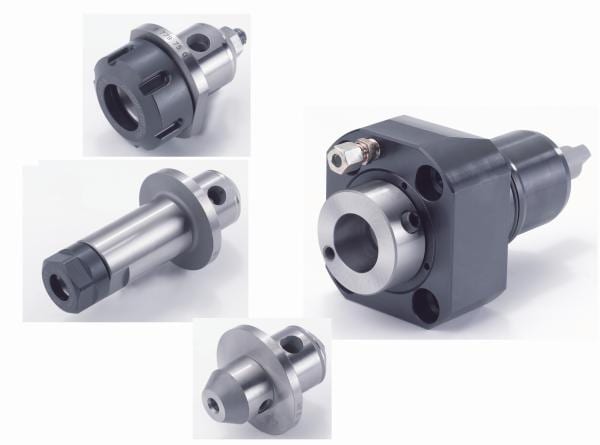
A true quick-change system can be set offline and quickly installed, but it must be considered in light of today’s AND tomorrow’s workload.
beneficial. Adapters can be set offline and ready to go for minimal changeover time.
When coolant-thru tools are selected, it is imperative you first check the machine specifications to be sure your tool is capable of handling the coolant pressure of the machine. In general, your internal coolant live tools should be able to handle 1000 psi or more.
If your live tool is constructed with large, high accuracy bearings, the tool will have excellent rigidity and premium cutting performance, with minimal runout. (0.0002” or 0.006mm is a desirable goal.) The bearings, combined with ground, paired and high accuracy gears, make for tools that are consistent and long lasting. Bore tolerance is absolutely key in maintaining proper bearing load and this factor should never be compromised.
In addition, you should consider the many applications that can be accomplished with the proper live tool. You can purchase speed increasers for higher rpm, gear reducers for added torque, adjustable angle tools for compound angles, multiple-spindle tools for additional capacity, or gear hobbing tools for spline or gear cutting. Most of those items are standard catalog devices, but one more piece of advice: never shy away from the custom tool, when appropriate and justified by the job you have in-shop today, as well as the ones you might have tomorrow. A good tooling supplier will work with you to produce custom tools at reasonable prices, but the supplier must be very reliable, so look for one with grinding, finishing and perhaps even heat treating in-house or very closely monitored, to do such work. Additionally, be certain the supplier has local support and tools can be repaired or reworked quickly and correctly.
The workpiece materials are always a driver. Those of you doing medical machining know this well. Buying a less expensive or lower featured tool to work cobalt chromium and titanium is a really bad idea, to be blunt.
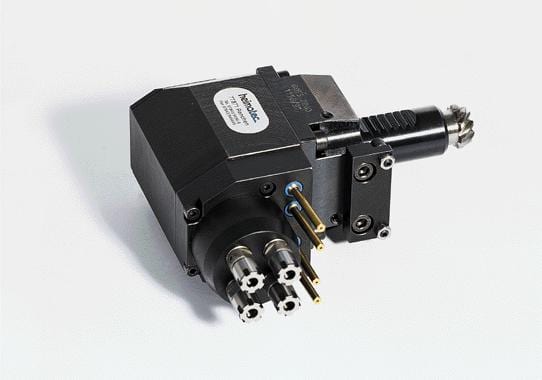
Custom tools, though usually dedicated to a particular application, can be the best solution, IF the design and construction of the tool is solid and the application engineering and after-sale support is available locally to service it.
On a practical level, always check the supplier for inventory and source of supply. Today, when your customers are demanding faster response times and more cost off-loading, you can expect the same from your tooling supplier. Likewise, application and engineering assistance should be available from local sources to support your tool choices.
The bottom line is the bottom line for most of us today. However, always consider the future jobs when purchasing tooling systems for your new and existing lathes. What might seem a bargain might not be, after the first big job is completed.
DIN and ABEC standards are the norm in industry and your supplier should be willing to supply all necessary documentation on request. Shortcuts on quality are never, repeat never, worth the short-term savings.
I hope this short primer on tooling will assist you in equipping your next machines.
For addition information or inquiries, please contact:
Preben Hansen, President
HEIMATEC INC.
16 E. Piper Lane Suite 129
Prospect Heights, IL 60070
Phone: 847-749-0633
Fax: 847-749-2445
Email: info@heimatecinc.com
Website: www.heimatecinc.com
—
Heimatec is an international tooling manufacturer, based in Renchen, Germany. Its experienced staff is dedicated to providing customers the most innovative tooling technology possible. In 2010, the company opened Heimatec Inc. in Prospect Heights, IL, near Chicago, to serve its growing North American customer base with sales and service, plus an extensive inventory of products. Heimatec serves the auto, aero, medical, off-highway, rail, energy, woodworking, composites and other industries, as well as an ever-increasing number of machine tool OEM’s worldwide.
Continue readingOne job that took two weeks due to reworks now done in two days, the result of Tenaxol polymer quenchant with anti-foaming agent and greater concentration consistency

Brothers TJ (left) and Jacob Dohlun operate Complete Heat Treating, companion company to Wisconsin Steel Industries, both in the Milwaukee area. Complete operates open fire furnaces and quench tanks to process large steel castings and forgings, as well as metal fabrications and some aluminum parts.
TJ and Jacob Dohlun are not easily impressed. Despite their relatively young ages, 40 and 32 respectively, they have both worked in the family’s dual heat treating businesses in the Milwaukee area, as far back as they can remember. Their grandfather, Theodore Dohlun, started Wisconsin Steel Industries in 1939 and the family has had involvement in heat treating for three generations. Their dad Ted continued the tradition until his recent retirement and both of the “boys” have been active a long time. They began Complete Heat Treating in 2007 as a separate entity and run it with their mother, Chris Dohlun.
Both Wisconsin Steel and Complete Heat Treating run commercial heat treating operations, serving regional manufacturers in the mining, construction, wind energy, rail, government contract, medical, off-road and agricultural equipment industries. They also serve companies as far away as Brazil, however. Combined, they employ approximately 50 people at the two facilities, processing materials such as 4140 and 4340 steel in the forms of castings and forgings up to 100,000 pounds, as well as fabrications and some aluminum parts.
Never ones to rest on their laurels, however, TJ and Jake have been making significant improvements in their operations, especially on the technology side. They use a proprietary software system to operate their furnaces, they’ve incorporated a number of green initiatives into the business operation and, about a year ago, switched their polymer quenchant supplier to the originator of that chemistry, Tenaxol (Elkhorn, Wisconsin).
At Wisconsin Steel and Complete Heat Treating, they run a total of 13 open fire car bottom and feed furnaces with capacities up to 1,000,000 pounds and workspaces up to 52’ long x 20’ wide x 16’ high. Quench tanks at the facilities range up to 40,000 gallons.
Typically, hardness and mechanical specs are supplied by the customers and the metallurgists and chemists in the labs at these facilities work to determine the optimum processing conditions. Wisconsin Steel is rated to the GE Nuclear standards, while Complete Heat Treating received its ISO 9001:2008 certification just recently.
Many value-adding secondary services are supplied here, including machining, straightening, roto-blasting and saw cutting, as well as metalcoating.
The quenching operations at Complete were a particular challenge, owing to the large parts processed here, the dwell times in the quench tanks and the recurrent problems of concentration flux and, most notably, foaming and dragout. As TJ explains, “We were having a lot of problems on one part, a spun metal with thin but substantial surface area and a rimmed edge. The dragout and the excessive foaming were causing us to rework parts to hit the spec. There were shipping delays and we were struggling to hold the concentrations in the tanks for any extended period.”
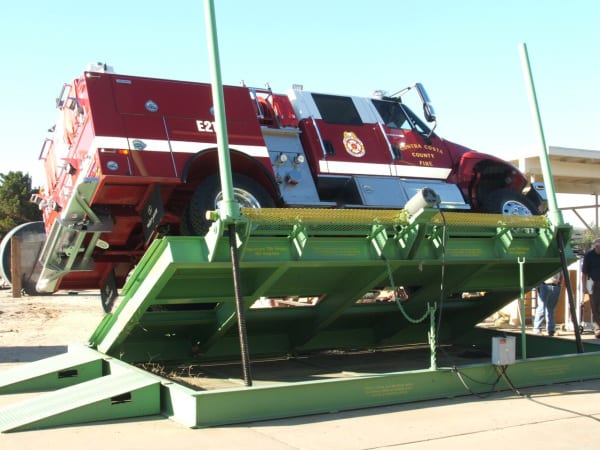
Previous polymer quenchants were causing excessive foaming and were inconsistent in holding concentrations. Both problems were overcome with Tenaxol polymer quenchants, according to the brothers.
Jacob adds, “We had been talking to Tenaxol about their anti-foaming products and, despite some cost differences with our then-current supplier, we agreed to testing. Although we were not a customer, the Tenaxol team really went the extra mile to give us the best results their lab could suggest.” As a result, Tenaxol Quench 2500 Ultra polymer quenchant with a non-nitrite corrosion inhibitor, defoamer and biocide was purchased from this new supplier and the results have been outstanding, according to the Dohlun brothers. “We no longer have consistency issues, the percentages stay in line, plus we can vary the temperatures in the tanks without compromising performance. That opens more opportunities for new business and it’s been working very well.” Complete Heat Treating is currently on a record sales pace, with more customers and much faster throughput, boasting a 25% increase in sales and working capacity today. On that spun metal part, for example, TJ notes, “We went from two weeks with a lot of rework to two days on a typical batch.” Jacob adds, “The savings in staged deliveries alone run to thousands of dollars, each time.”Complete is now able to process a wider range of materials, as a result of using Tenaxol quenchants, according to the brothers, who credit Jim Harrison, CEO at Tenaxol, and his team of chemists and metallurgists with much of the significant improvement in their processing scenario.
Describing the situation when the previous quenchant vendor was used, “On that spun metal part, for example, our stacker crane would come out of the tank, full of foam. It looked like a bubble bath,” Jacob joked. TJ further noted the drain-off of the Tenaxol product allowed the parts to enter the tempering furnace much faster, avoiding excess cooling of the surface area. The Complete customer for this job, Rich Prescott of Glenn Metalcraft (Princeton, Minnesota), echoes the Dohlun’s, “The turnaround time has been super. They made great improvement in their deliveries to us over the last year and that’s helped us satisfy our customers faster.”
“This anti-foaming agent in the Tenaxol product has literally changed our shop,” TJ concludes. Jacob also cited the supplier’s customer service. “We get help from their lab on a regular basis, including water testing and support documentation, which is necessary for the PPAP requirements of several customers.” He adds, “Jim (Harrison) and his team did a lot of testing for us, before making their final recommendations and they continue to help us fine tune our operation.” He further noted Tenaxol’s involvement with MTI was important. “This supplier supports our industry and that meant a lot to us.” The supplier also provided a solution to problems Complete was experiencing in their cooling tower water by conducting lab testing, automated equipment and cost-effective chemical treatments, according to Dohlun.
As a result of this initial relationship with Tenaxol, Complete Heat Treating has expanded its purchases of products to include various greases and lubricants from this vendor, which is part of the Chemtool family of companies, a wide-ranging industry supplier of myriad lubricant, cleaning and metalcutting fluid products.
To see a video of heat quenching at Complete Heat Treat, click HERE.
For more information on this story, interested parties should contact:
COMPLETE HEAT TREATING
125 E. Greenfield Ave. Milwaukee, WI 53204-2937
Phone: 414-643-5161
Web: www.CompleteHT.com
Attn: TJ Dohlun or Jacob Dohlun
TENAXOL TECHNOLOGIES, INC.
1001 E. Centralia St. Elkhorn, WI 53121
Phone: 414-476-1400
Web: www.tenaxol.com
Attn: Jim Harrison
Significantly reduces inventory, changeover time for lathe and mill/turn users
See the U-Tec video HERE.
Heimatec, a world leader in live tools, angle heads and multi-spindle drill heads, today announced immediate availability of its newest development, recently unveiled at IMTS.
U-Tec® is the company’s patented flexible tool adapter system that allows a standard ER output live tool to accept various adapters for different applications. This allows users the ability to have quick changeover of tools on almost any lathe, using a single live tool, without having to commit to a quick-change system on the initial purchase. A facemill adapter, for example, can be quickly positioned into the standard holder, without the need for a completely new base being installed. This significantly reduces inventory costs as well as changeover time, for the busy shop.
The U-Tec® system, according to Heimatec Inc. President Preben Hansen, “…represents a real improvement in lathe and mill/turn tooling design. U-Tec® allows great user flexibility, while a polygonal drive system ensures extremely high power transmission stability and faster set-up with absolutely no loss in performance or accuracy, because the live tool base remains in position and only the adapter and collet get swapped.”
He went on to explain the unique collet nuts on the U-Tec® system have internal threading for rigid mounting and that this new tool adapter system enables the actual cutting tool to be brought into closer proximity to the bearing, thus further improving performance in use. This benefit results from the short and compact tool length design. Internal coolant up to 2000 psi(140 bar) is provided standard.
Every adapter in the U-Tec® system comes complete with any necessary clamping nuts and adapters are immediately available in face mill style, ER extensions, side lock, shrink fit, hydraulic and blank.
The U-Tec® system is available for all major turning machines on the market today. Heimatec currently manufactures over 10,000 live tool types.
For further information and literature on this new product, please contact:
Preben Hansen, President
HEIMATEC INC.
16 E. Piper Lane Suite 129
Prospect Heights, IL 60070
Phone: 847-749-0633
Fax: 847-749-2445
Email: info@heimatecinc.com
Website: www.heimatecinc.com
—
Heimatec is an international tooling manufacturer, based in Renchen, Germany. Its experienced staff is dedicated to providing customers the most innovative tooling technology possible. In 2010, the company opened Heimatec Inc. in Prospect Heights, IL, near Chicago, to serve its growing North American customer base with sales and service, plus an extensive inventory of products. Heimatec serves the auto, aero, medical, off-highway, rail, energy, woodworking, composites and other industries, as well as an ever-increasing number of machine tool OEM’s worldwide.
Continue reading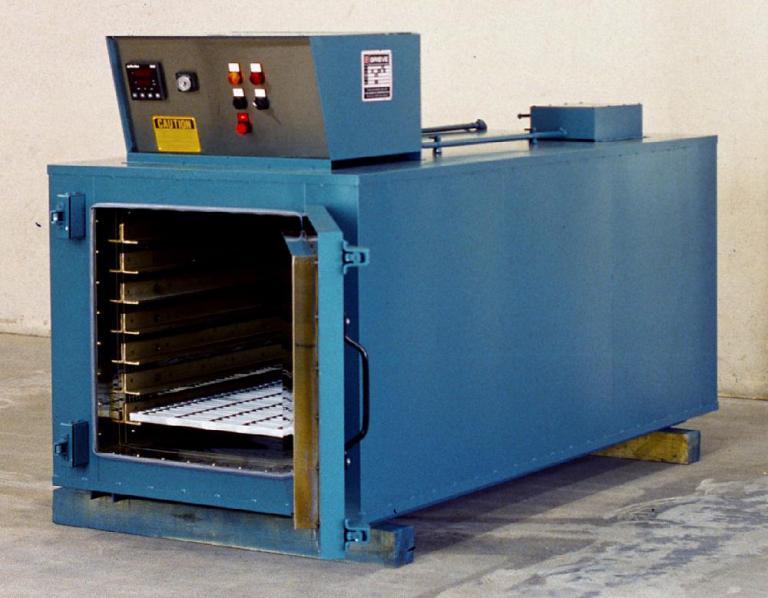
6.6 kW installed in Nichrome wire heating elements provide the heat, while a 600 CFM, 1/3-HP recirculating blower furnishes a universal pattern airflow to the workload.
This oven features an aluminized steel exterior, Type 430 stainless steel interior and 4” thick insulated walls, plus a silicone rubber door gasket and explosion-venting latches. A 500 lb. capacity subway grating shelf and seven angle iron shelf supports are included.
No. 891 has a digital indicating temperature controller to display actual and set point readings.
For more information, please contact:
THE GRIEVE CORPORATION
500 Hart Road
Round Lake, IL 60073-2898
Phone: (847) 546-8225
Fax: (847) 546-9210
Web: www.grievecorp.com
Email: sales@grievecorp.com
Attention: Frank Calabrese, VP
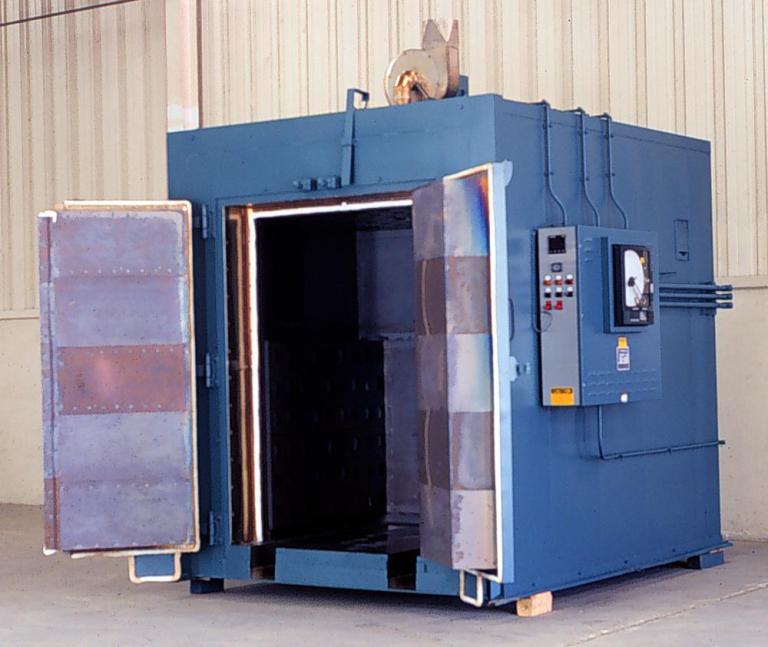
Workspace inside this oven measures 48” wide x 72” deep x 72” high and a maximum temperature of 1200ºF is provided by 120KW power, installed in Incoloy-sheathed tubular heating elements. A 10,000 CFM, 7 ½-HP recirculating blower provides combination vertical/horizontal airflow to the load.
No. 835 features an aluminized steel exterior, 16 ga. stainless steel interior and 10” thick insulated walls, comprising 2” of 1900ºF block and 8” of 10 lb. density rockwool insulation, as well as a 7” insulated floor with integral truck wheel guide tracks.
Safety and control equipment on this Grieve oven includes a 325 CFM powered forced exhauster, digital indicating temperature controller, manual reset excess temperature controller with separate contactors, recirculating blower airflow safety switch, and a 4-pen circular chart recorder.
For more information, please contact:
THE GRIEVE CORPORATION
500 Hart Road
Round Lake, IL 60073-2898
Phone: (847) 546-8225
Fax: (847) 546-9210
Web: www.grievecorp.com
Email: sales@grievecorp.com
Attention: Frank Calabrese, VP